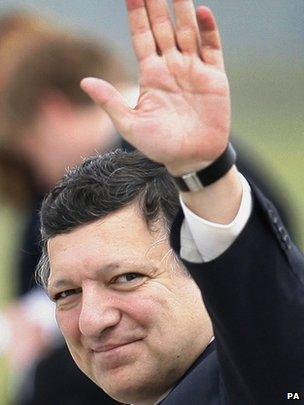Who's the real challenger to Scotland in Europe?
- Published
It is not often, in truth, that one hears a leading Conservative voice sympathy for anyone connected with the European Union, far less the president of the European Commission.
It was a Tory government which took Britain into Europe. But these days, the Tories - particularly with UKIP at their heels - tend to appear far less communautaire than might have been the case in that Heathite past.
However, Annabel Goldie was definitely fretting about Jose Manuel Barroso, the Euro gent whose intervention this week in a BBC interview has caused such a fuss. Mr Barroso had said that a territory departing from a member state had to apply to the EU afresh.
It appeared to Ms Goldie that the Scottish government's strategy in response to this initiative was to send the redoubtable Nicola Sturgeon out to Brussels to put the president right. "Poor man," she declared.
It was, of course, a mischievous caricature. But Ms Sturgeon was in no mood for light comedy.
Came out fighting
The SNP are only too well aware of the extent of the confrontation posed by the EU issue. Taken to the max, it challenges a portion of the reassurance that they offer with regard to independence - which is that Scotland would retain key existing structures such as the monarchy, sterling - and the EU.
So she went for it. The Tories, she said, presented the real challenge to Scotland in Europe - because they appeared intent on taking the UK out of the EU. (David Cameron is under pressure from a portion of his party to hold an in/out referendum.)
As for the position of an independent Scotland, was Ms Goldie or anyone else seriously suggesting that Scotland would be kicked out? If so, then perhaps they might oblige the chamber by saying so. Put up or shut up, in short.

Jose Manuel Barroso had an unlikely defender in Tory Annabel Goldie
It was a bold, confident and combative performance by Ms Sturgeon - reflecting, in sum, her character, her ability - and the extent of the political challenge to the SNP implicit in this controversy.
Potentially cornered, she came out fighting. But, in so doing, she deftly modulated the Scottish government's position, as Alex Salmond had done earlier when facing his weekly session of questions.
Ms Sturgeon stressed that the SG had repeatedly said that there would have to be negotiations - talks which, she argued, prove successful and in Scotland's interests. She further repeated her belief that the commission President was wrong, in law.
The change was that the emphasis was much, much more upon the former statement than the latter. In the past, there had been talk of "automatic" Scottish membership of the EU. This particular word was excised from Ms Sturgeon's discourse.
While not in any way conceding the legal point, she relied upon "common sense and realism". Scotland wanted to stay in the EU - and the EU would want "oil rich, renewables rich and fishing rich" Scotland. The talks would be about terms, not principle.
Aye, there's the rub, argued Willie Rennie for the Liberal Democrats. What might those terms be? Would they be favourable? The Euro? Schengen? The Thatcher rebate? What would have to be surrendered?
'Sent to bed'
Ms Sturgeon argued that Scotland would strike a good bargain. In essence, again, her argument was founded upon the goodies which Scotland would bring to the EU table. That, together with the intrinsic impetus of the EU to be inclusive, not exclusive.
At First Minister's Questions, Labour's Johann Lamont took things further. The FM, she implied, was serially guilty of making assertions which turned out to be less than substantive. Instead of leading, he was misleading.
Perhaps it was because she comes second in the question order, but Ruth Davidson seemed to feel the need to go further still. Both Mr Salmond (over the EU) and John Swinney (over the Bank of England) had been "spanked and sent to bed."
As the chamber paused momentarily to let that image subside, Mr Salmond rose. There had been exchanges of information with the Bank, primarily through the SG's Fiscal Commission. On the EU, Scotland was in and staying in.